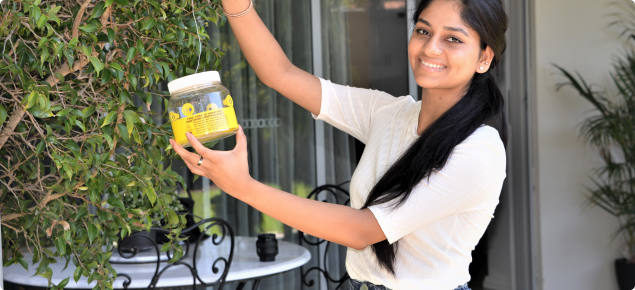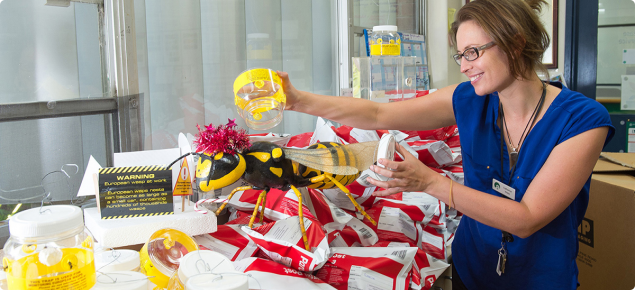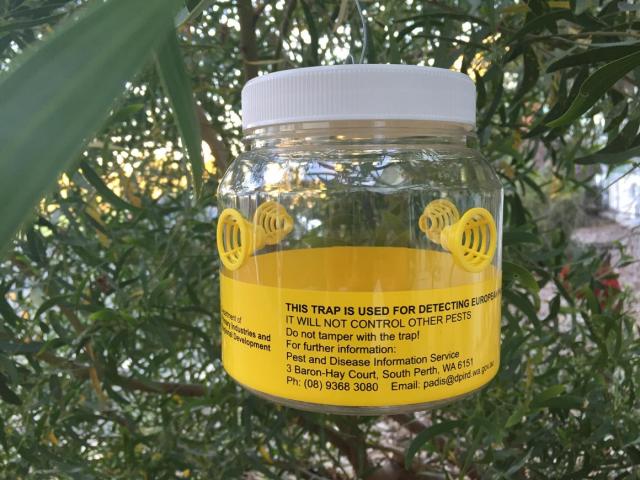| Established in 2011, the Adopt-a-trap program enables members of the public to sign up to “adopt” a surveillance trap and monitor it during the European wasp season (December – May).
If you’d like to become involved in our current program, SIGN UP HERE!
REMEMBER: If you have a trap, register your trap position by making a report on the MyPestGuide™ Reporter webpage or app. Alternatively, let our Pest and Disease Information Service (PaDIS) know on 9368 3080 or padis@dpird.wa.gov.au that you are trapping this season, along with your address.
Early detection of European wasps is important to prevent the establishment and spread of nests in Western Australia. We can't look everywhere, especially in remote areas of WA. Help us by filling in the gaps in our surveillance and keep your community, lifestyle and business safe. |
Adopt-a-trap participants - check whether it is time to put up your traps or take them down!
December: Wasp season is December to May so when the weather starts heating up, it's time to hang your traps. December is the time to get your traps and fish ready for the new season!
Check out our guide to setting up your trap.
June: The weather starts to cool and the rain begins, and so the fish in your trap starts to get smelly and unappetising to both you AND European wasps! As winter approaches the trapping season draws to a close and traps need to be brought in, emptied and cleaned with warm soapy water and stored for the next season (commencing December).
About Adopt-a-trap
The expansion of the European wasp population through South Australia and eastern Australia is a concern to all Western Australians. Fertilised wasp queens are increasingly likely to be accidentally transported into our State and establish nests. Nest numbers can grow exponentially if not detected.
Adopt-a-trap is an initiative established in 2011 to counteract this increased invasion risk. It promotes the involvement of local government, business, industry and members of the public to monitor for European wasps in their area during the active wasp surveillance season (December - May).
To date, more than 1000 surveillance traps have been adopted by the public, local government and industry.
How to get trapping
Trapping is as simple as hanging a trap in a tree, inspecting the trap and changing the raw fish lure every fortnight (weekly is even better). We will post you a free trap, but we can't post the fish!
We have detailed instructions on how to set up, maintain and service the traps as well as on how to report European wasps suspect sightings.
Please note:
- Our Adopt-a-traps can only be adopted by people in Western Australia at present. If you live interstate, there may be a better option for you that focuses on the control of this species
- This trap won't control wasps or other insects, instead, it acts by attracting European wasps if they are nesting in your area
- Don't worry, this trap won't encourage wasps to your property. But if European wasps are nearby - you'll want to be the first to know!
- If you catch anything that looks like a European wasp, let us know. If it's a European wasp, we will find the nest near you, and eradicate it free of charge.
Join our surveillance team
SIGN UP NOW to recieve a trap and join our surveillance efforts.
Even if you don't have a trap, you can contribute to surveillance considerably by looking for suspicious wasp activity. Look at insects visiting your taps, bird bath or garden, and have a close look at those being scooped up in the pool! It's amazing how many confirmed reports we've received by people doing these every day activities.





